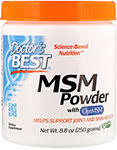
Read Dr. Beth's Latest Article:
Spermidine - The Latest in Anti-AgingDr. Beth Recommends these products:
Top 7 Reasons for Hair Loss
1. Iron Deficiency
Iron is one of those super-important minerals that you don’t want to have too much or too little of. Having too little iron is also well-known cause of hair loss.
Iron deficiency is more common in women due to the loss of iron from childbearing and menstruation, but can also be caused by eating disorders, vegan or vegetarian diets, gut absorption issues (such as low stomach acid), frequent blood donation or internal bleeding.
Checking in with your doctor or dermatologist to request an iron panel that includes ferritin (iron stores in the body) is a good idea. Ferritin should be above 40-50 ng/mL to stop hair loss, and over 70 ng/mL for healthy hair regrowth.
2. Zinc Deficiency
Although the connection between zinc and hair loss is not completely clear, there is often a correlation found between hair loss and those with low zinc levels.
You can find zinc abundantly in animal proteins and some plant foods, although the bioavailability of zinc is greater in animal proteins. This puts vegans and vegetarians at a greater risk of deficiency. Zinc is also depleted with stress.
3. Over-supplementation
According to a 2017 article in the Dermatology Practical & Conceptual Journal, Over-supplementation of fat soluble nutrients, including selenium, Vitamin A, and Vitamin E, has actually been linked to hair loss.
Risk of nutrient overload beyond that that can be seen by the naked eye include: liver toxicity, inflammation, stomach upset, and bloating. Fat soluble vitamins are not easily excreted in urine like water soluble vitamins, and are instead stored in the body.
4. Hypothyroidism
Low thyroid function is common can be a large contributor to hair loss, especially if the hypothyroidism is severe.
Hypothyroidism in short means that your body is not producing enough thyroid hormone. It can be caused by the autoimmune condition Hashimoto’s thyroiditis, as well as self-induced through dieting, over-exercising and other means of overextending your body, including stress.
Hair follicles are a direct target of thyroid hormones, and have modulating effects on hair follicle cycling and pigmentation. From the nutritional therapy perspective, it’s essential to make sure your body is getting all the macronutrients it needs (protein, carbs + fats), as well as all the raw materials it needs (specifically calcium and potassium) to support thyroid function as well as your body and its natural desire for health. Nutrients known to support the thyroid include iodine, tyrosine, selenium (but not too much, I suggest supplementing 3 to 5 days a week), ashwagandha, and B-12.
5. Protein Malnutrition
In the US, lack of protein is rare, but it can happen. A dramatic drop in protein intake can be enough to cause telogen effluvium. Telogen effluvium (TE) is a condition that causes the roots of the hair to prematurely go into the resting state and is typically caused by stress or some sort of shock to your system. TE can cause as much as 70% of scalp hairs to shed two months following the trigger event as the resting hair is eventually pushed out of the scalp.
Stress can also interfere with our breakdown of protein in the diet so you will often see stress and hair loss coincide.
6. Stress
Stress is the biggest cause of hair loss I’ve seen in my patients. The stress could come from a variety of sources, but is not limited to dieting, calorie restriction, sudden weight loss, over-exercising, menopause, childbirth, severe emotion stress (divorce, death of a family member, illness) and eating disorders.
All of these stressors can also trigger TE sending a large amount of your scalp hair into hibernation followed by the shedding cycle. Stress also rapidly uses up B vitamins, especially biotin, which is actually known as "the hair vitamin." All B vitamins are important for healthy hair growth.
Also known to enhance hair growth is MSM, a natural source of sulfur. The hair contains significant amounts of this mineral.
7. Testosterone
Hair loss is linked to the hormone testosterone, as the conversion of this hormone into a molecule called DHT is the main culprit of hair loss. DHT (sometimes called the bad form of testosterone) causes hair follicles to thin over time, eventually eliminating them completely. Researchers have found that the natural components of saw palmetto that block the enzyme work in a similar way to the synthetic ingredients in prescription hair loss medications.
Saw Palmetto acts in a similar way to finasteride by blocking the enzyme called 5-alpha-reductase which is the enzyme required for testosterone to convert into DHT. Some men have reported taking saw palmetto helps them regrow thicker, better hair.
Women can also experience hair loss due to testosterone imbalances and benefit from saw palmetto. I have a hormone saliva test kit to check for this imbalance.
Nutrition counseling with Dr. Beth is available to help you determine the best route for you to take to stop your hair loss.


























